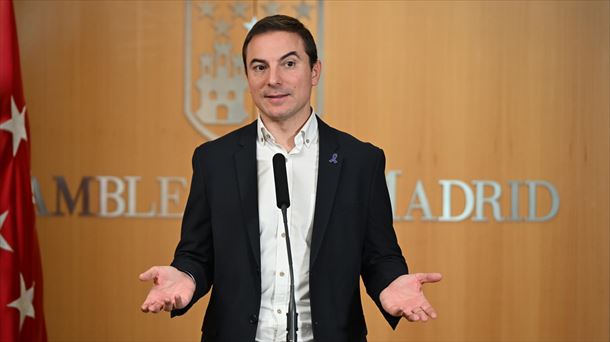Yesterday, Friday, a turbulent EU summit ended. During breakfast, an accidental “declaration of war” by Russia caused a stir, the Union remains divided over the Israel issue and the announced accession talks with Bosnia-Herzegovina only serve to buy time for Brussels. But first things first.
Kremlin spokesman Dmitry Peskov usually knows exactly what he is saying. In an interview with a Russian political magazine, he officially admitted for the first time that Russia is ‘at war’. Until now, the war in Ukraine has always been called a special military operation. Peskov said: “We are in a state of war. Yes, it started as a special military operation, but as soon as this group was formed and the collective West took part in it on the side of Ukraine, this became a war for us.”
These words were seen as a response. About the decision of EU members to continue the “Borrell plan”. Borrell had proposed that the EU use 90 percent of interest profits on frozen Russian assets to buy weapons for Ukraine. Ten percent should go to rebuilding Ukraine and strengthening the capabilities of the Ukrainian defense industry.D
European Commission President Ursula von der Leyen said at the latest press conference that the first funds could flow to Ukraine as early as July. The Member States must now quickly adopt a proposal. The European Commission expects interest income of up to three billion euros per year. But we are still far from an agreement. Austria in particular remains skeptical. As a neutral country you cannot participate in arms purchases and therefore you will ‘constructively abstain’.
Peskov’s statement should be understood as a response to the EU decision. Moments later, however, Peskov rowed back. In essence, he said, the fact that the West has decided to wage war against us does not mean that we are in a state of war. “It remains a special operation.”
Russia expert Alexander Dubowy does not believe it is a coincidence. The statements caused uncertainty in the West. “Exactly what Russia wants. Putin therefore remains unpredictable.” And it was a signal to the West: “There are no red lines in Putin’s world.”
The fact that the EU wants to confiscate interest income from Russian assets is sensitive for the expert: “Russia repeatedly propagates that the rules-based order of the West does not exist. The West makes up the rules, but does not follow them.” If the seizure is not legally justified, it will be a big boomerang for the West.
Israel is dividing Europe – for strange reasons
The EU remains deeply divided over the Israel issue. Chancellor Karl Nehammer demanded that the atrocities of the Islamist terrorist organization Hamas be clearly identified. But there was resistance. Belgium and the Netherlands keep their distance. For domestic political reasons. Both countries have a strong Islamic religious community and fear unrest if they side too strongly with Israel, we hear from negotiating circles. The Irish position towards Israel has always been quite cold. Ireland did not recognize Israel until 1963, and the Israeli embassy in Dublin opened in the mid-1990s. Irish politicians say it is hypocrisy when atrocities against civilians in Ukraine are criticized but not those in Gaza. Portugal and Spain are also traditionally more pro-Palestinian due to their strong socialist character. One reason for the anti-Israel stance is simple antipathy toward Prime Minister Benjamin Netanyahu, according to reports from Brussels. Therefore, Hamas’s atrocities are not explicitly mentioned in the conclusion, as the Chancellor wanted
The road from Bosnia to the EU is still long
Austria was extremely pleased that the EU Heads of State and Government had officially decided to start accession negotiations with Bosnia and Herzegovina. However, some EU countries had previously expressed concerns that the country had not yet implemented all the required reforms. Political scientist Vedran Dzihic from the Austrian Institute for International Politics also told the “Krone”: “The green light for the start of EU negotiations for Bosnia is only the beginning of a long road.” After the necessary reforms for which there is no domestic political consensus, the long path of negotiations follows. And the examples of Montenegro (since 2012) and Serbia (since 2014) show “how difficult it will be”. Dzihic is also sure: “In the current political constellation with a pro-Russian and secessionist President of Republika Srpska, Milorad Dodik, and the leader of the Croatian HDZ, Dragan Čović, for whom protecting his own interests is probably more important If it were to join the EU, Bosnia would not be able to meet the Copenhagen criteria. To put it bluntly: with ethno-nationalist politicians serving only their specific interests, Bosnia is not ready for the EU.”
One of the leading experts on Balkan foreign policy, Vuk Vuksanović, takes a somewhat tougher approach to the EU and Bosnia in the ‘Krone’ discussion: ‘Right now the chances of joining – just like all other Balkan states – non-existent. .” Bosnia I was given the status only because “anything else would have been an insult. The EU cannot grant accession status to a country at war (Ukraine), but not to a country where the war has been over for 27 years.”
Source: Krone
I am Ida Scott, a journalist and content author with a passion for uncovering the truth. I have been writing professionally for Today Times Live since 2020 and specialize in political news. My career began when I was just 17; I had already developed a knack for research and an eye for detail which made me stand out from my peers.



